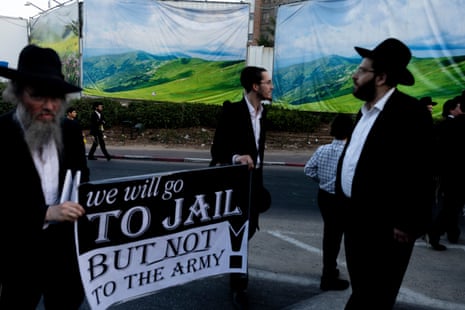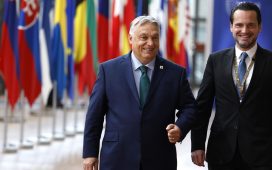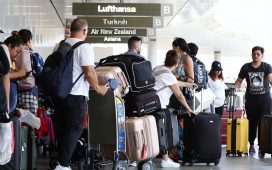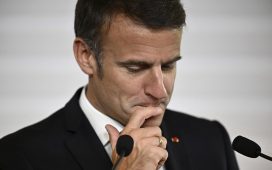Ultra-Orthodox Jews block highway to protest Israel’s new mandatory military service ruling
Hundreds of ultra-Orthodox Jewish men blocked a major highway in central Israel for two hours on Thursday to protest a recent supreme court decision ordering young religious men to enlist for military service, reports the Associated Press (AP).
According to the AP, protesters sat on the highway and lay on the ground as police lifted them up and dragged them away. Officers mounted on horseback charged into the crowd. Many demonstrators held signs and chanted “To prison! Not to the army!”
“We all came here for one goal, we reflect the position of all the Orthodox public,” said a young man, identifying himself to the AP only by his first name Ozer. “All the Orthodox public prefers to go to prison and not to the army.”

The ultra-Orthodox see their full-time religious study as their part in protecting the state. Many fear that greater contact with secular society through the military will distance adherents from strict observance of the faith.
The supreme court this week ordered the government to begin drafting ultra-Orthodox men, saying the system of exemptions is unequal. Military service is compulsory for most Jewish men and women in Israel.
The AP reports that the decision could lead to the collapse of prime minister Benjamin Netanyahu’s government. Ultra-Orthodox parties and their followers oppose any change in the system.
Ultra-Orthodox leaders have not yet said whether they will quit the government, but their followers have scheduled a large protest in Jerusalem on Sunday.
Key events
We reported earlier that Israeli soldiers destroyed 11 homes and other structures in an isolated community in the Umm al-Kheir village in the occupied West Bank, leaving 50 people homeless. Footage of that can be seen here:
Here are some of the latest images from photographers on the ground in Gaza:
Israel destroys 11 homes in West Bank village

Bethan McKernan
Israeli soldiers have destroyed 11 homes and other structures in an isolated community in the occupied West Bank, leaving 50 people homeless, amid a reported uptick in house demolitions and spiralling violence in the Palestinian territory.
Contractors with bulldozers accompanied by Israel Defense Forces (IDF) troops arrived in Umm al-Kheir, a village mostly home to shepherds, on Wednesday morning and demolished six houses, tent residences, an electricity generator, solar cells and water tanks, according to residents and Israeli activists who documented the proceedings. Agricultural land and fences were also damaged and trees uprooted.
The demolition has destroyed about a third of the village’s infrastructure.
Palestinian official rejects Israeli minister’s move on West Bank settlements
A senior Palestinian official rejected on Friday a move by Israel’s finance minister intended to promote new Jewish settlements in the occupied West Bank, saying it was aimed at pursuing a “war of genocide” against Palestinians, reports Reuters.
Finance minister Bezalel Smotrich said on Thursday that the Israeli government would also take punitive steps against the Palestinian Authority in response to Palestinian moves against Israel internationally.
Asked about Smotrich’s statement, which was not confirmed by the government, Wasel Abu Youssef, a member of the executive committee of the Palestine Liberation Organization (PLO), said the settlements were “illegal colonies that violate all international resolutions”.
“The decisions by the occupation government aim to pursue the war of genocide against our Palestinian people,” he told Reuters. He said the PLO and the Palestinian Authority would continue to press for Israel to be taken before international courts and punished for “crimes against our people, and in particular in the Gaza Strip.”
Israel has rejected accusations brought by South Africa at the UN’s top court that its military operation in Gaza is a state-led genocide campaign against Palestinians.
According to Reuters, Smotrich, who heads a pro-settler party, said the government supported his proposal. Israeli prime minister Benjamin Netanyahu’s office, which usually announces cabinet-level decisions, issued no statement and could not be reached for immediate comment said Reuters.
Steps which Smotrich said he was advancing included revoking “various approvals and benefits” for senior officials in the Palestinian Authority, approving new settlements and retroactively sanctioning some Jewish settlements.
Israeli forces push deeper into southern and northern Gaza
Israeli forces deepened their incursion into two northern and southern areas of the Gaza Strip on Friday, and Palestinian health officials said tank shelling in Rafah killed at least 11 people, reports Reuters.
According to the news agency, residents and Hamas media said tanks advanced further west into the Shakoush neighbourhood of Rafah, forcing thousands of displaced people there to leave their tent camps and head northward to the nearby Khan Younis.
The Israeli military did not immediately comment, said Reuters.
Since 7 May, tanks have advanced in several districts of Rafah, and forces remained in control of the entire border line with Egypt and the Rafah crossing, the only gateway for most of Gaza’s 2.3 million people with the outside world.
One resident, who spoke to Reuters via a chat app, said some bulldozers in the Shakoush area were piling up sand for Israeli tanks to station behind. “Some families live in the area of the raid and are now besieged by the occupation forces,” he told Reuters.
“The situation there is very dangerous and many families are leaving towards Khan Younis, even from the Mawasi area as things became unsafe for them,” said the man, who moved northward overnight.
IDF confirm its operation in Gaza City’s Shujayea neighbourhood
Al Jazeera reports that the Israeli military confirmed that it is operating in Gaza City’s Shujayea neighbourhood after receiving intelligence that, it says, signalled the presence of “terrorists and terrorist infrastructure”.
The broadcaster cited a situational update by the Israeli army on Telegram: “The troops began their targeted activity in the area of Shujayea during the day. Overnight, they started to conduct targeted raids in the area.”
The Times of Israel, also reporting on the statement, said the Israel Defense Forces (IDF) said dozens of Hamas sites were struck from the air.
The IDF also said it had conducted several strikes in the northern Gaza Strip and said “dozens of terrorists who were hiding in Unrwa schools and facilities were eliminated”.
According to its statement, the military said that a fighter jet struck a Hamas operative in a building in central Gaza’s Deir al Balah, within the Israeli-designated “humanitarian zone.”
“The terrorist operated from within the humanitarian area, which the organisation uses as a shield for terrorist activity,” the IDF says. Hamas have previoulsy denied using civilians and civilian infrastructure as human shields.
The Israeli military said that ahead of the strike, it worked to evacuate the civilian population from the area of the building.
A trio of rights groups took the Dutch government back to court on Friday, arguing that a ban on supplying F-35 fighter jet parts to Israel is not being respected in practice, reports Agence France-Presse (AFP).
In a landmark verdict in February, an appeals court ordered the Netherlands to stop delivering parts for fighter jets used by Israel in its offensive in the Gaza Strip. The court said at the time there was a “clear risk” the planes would be involved in breaking international humanitarian law.
But the rights groups are returning to court, saying that the ban has not prevented the parts ending up in Israeli planes.
“Unfortunately, everything indicates that these parts end up in Israel from the Netherlands via other routes,” said Oxfam Novib, one of the groups involved in the case.
The Dutch government “has continued delivering [parts] to other countries, including the United States. And that contravenes the order of the court,” Liesbeth Zegveld, a lawyer representing the rights groups, told the court.
“The court order [from February] applies to all F-35 parts with Israel as the final destination and the state must stop all such deliveries in practice,” she argued. The government must “actively prevent” parts reaching Israel, said Zegveld.
Citing court documents, public broadcaster NOS said the Dutch government had acknowledged it could not prevent parts shipped to the US eventually ending up in Israeli F-35s.
According to the documents cited by NOS, the US ships fighter jet parts produced by the Dutch to other countries for a global pool of spare parts. Israel also draws from that pool.
AFP reports that the Dutch government has said it would fulfil the February verdict but announced it would appeal to the supreme court.
Government lawyers argued during that case that if the Dutch did not supply the parts from the warehouse based in the Netherlands, Israel could easily procure them elsewhere.
A ship’s captain reported that five missiles had landed close to his vessel in the Red Sea, 150 nautical miles (172 miles) northwest of the Yemeni port city of Hodeidah, the United Kingdom Maritime Trade Operations (UKMTO) monitor said on Friday.
After posting earlier that it had received the report and that authorities were investigating (9.32am BST), the UKMTO said the ship had reported no damage and was heading northward. It gave no information on the ship or its cargo, reports Reuters.
International shipping has been disrupted since November by attacks in the region launched by Yemen-based Houthi militants.
Many vessels have since opted to avoid the Red Sea route to the Suez Canal, taking the longer journey around the southern tip of Africa instead.
Ultra-Orthodox Jews block highway to protest Israel’s new mandatory military service ruling
Hundreds of ultra-Orthodox Jewish men blocked a major highway in central Israel for two hours on Thursday to protest a recent supreme court decision ordering young religious men to enlist for military service, reports the Associated Press (AP).
According to the AP, protesters sat on the highway and lay on the ground as police lifted them up and dragged them away. Officers mounted on horseback charged into the crowd. Many demonstrators held signs and chanted “To prison! Not to the army!”
“We all came here for one goal, we reflect the position of all the Orthodox public,” said a young man, identifying himself to the AP only by his first name Ozer. “All the Orthodox public prefers to go to prison and not to the army.”
The ultra-Orthodox see their full-time religious study as their part in protecting the state. Many fear that greater contact with secular society through the military will distance adherents from strict observance of the faith.
The supreme court this week ordered the government to begin drafting ultra-Orthodox men, saying the system of exemptions is unequal. Military service is compulsory for most Jewish men and women in Israel.
The AP reports that the decision could lead to the collapse of prime minister Benjamin Netanyahu’s government. Ultra-Orthodox parties and their followers oppose any change in the system.
Ultra-Orthodox leaders have not yet said whether they will quit the government, but their followers have scheduled a large protest in Jerusalem on Sunday.
More than 625,000 children in Gaza have been out of school for longer than 8 months, according to the United Nations Relief and Works Agency (Unrwa).
Posting on X, the UN agency for Palestinian refugees said that 300,000 of the 625,000 children were Unrwa students before the Israel-Gaza war.
More than 625,000 children in #Gaza have been out of school for over 8 months – 300,000 of them were @UNRWA students before the war
Play and learning activities provided by @UNRWA teams are critical in preparing children to get back to school and restore their right to education pic.twitter.com/lRTbSFpYFW
— UNRWA (@UNRWA) June 28, 2024
US imposes fresh sanctions on Iran over apparent nuclear escalations

Robert Tait
The US secretary of state, Antony Blinken, has announced fresh sanctions against Iran’s petroleum sector in response to what he described as an expansion of the country’s nuclear programme which has provoked renewed fears that it is preparing to build an atomic bomb.
The embargos – on three unnamed entities involved in the transport of Iranian petroleum or petrochemical products – were announced amid a chorus of warnings of a renewed conflict in the Middle East between Israel and Iran’s proxy Hezbollah, the powerful Shia group that dominates Lebanon.
In a statement on Thursday, Blinken said Iran had expanded its uranium enrichment programme in the past month “in ways that have no credible peaceful purpose”.
Under the new sanctions, 11 vessels associated with the three embargoed organisations would be designated as “blocked property”.
“Iran’s actions to increase its enrichment capacity are all the more concerning in light of Iran’s continued failure to cooperate with the IAEA [International Atomic Energy Agency] and statements by Iranian officials suggesting potential changes to Iran’s nuclear doctrine,” Blinken said.
He was referring to recent comments by Kamal Kharazzi, an adviser to Iran’s supreme leader, Ayatollah Ali Khamenei, that the country could revise its defence doctrine to permit the building of nuclear weapons following a series of military exchanges with Israel in April.
Robert Tait is a journalist based in Washington DC. He was previously the Guardian’s correspondent in Czech Republic, Iran and Turkey.
The United Kingdom Maritime Trade Operations (UKMTO) said on Friday it had received a report of an incident 150 nautical miles (172 miles) north west of the city of Hodeidah in Yemen.
It said authorities are investigating.
Tedros Adhanom Ghebreyesus, the director general of the World Health Organization (WHO) has welcomed the evacuation of a number of patients out of Gaza, but said that more than 10,000 patients still need medical evacuations.
We welcome yesterday’s evacuation of 21 patients outside of #Gaza. This is the first since the Rafah crossing closure on 7 May.
Over 10,000 patients still need medical evacuations.
We appeal for facilitated medical evacuation via all possible routes, including Rafah and Karem… pic.twitter.com/A2o1zFD7UO
— Tedros Adhanom Ghebreyesus (@DrTedros) June 28, 2024
In a post on X, he wrote:
We appeal for facilitated medical evacuation via all possible routes, including Rafah and Karem Shalom, to Egypt, the West Bank, East Jerusalem, and from there to other countries when needed.
We appeal for sustained medical evacuations and a safe, timely, transparent and organised process. These patients urgently need specialised lifesaving care which they cannot get in Gaza.
Israeli military order new evacuations from Gaza City neighbourhoods amid heavy bombing
On Thursday, the Israeli military ordered new evacuations from Gaza City neighbourhoods that were heavily bombed and largely emptied early in the war, reports the Associated Press (AP).
The latest orders apply to Shijaiyah and other neighbourhoods where residents reported heavy bombing on Thursday.
First responders with Gaza’s Civil Defence said airstrikes hit five homes, killing at least three people and injuring another six. It said rescuers were still digging through the rubble for survivors. The Palestinian Civil Emergency Service said the number killed in Shijaiyah by Israeli strikes was at least seven.
The AP reports that Shijaiyah residents in a messaging group shared video showing large numbers of people fleeing the neighbourhood on foot with their belongings in their arms.
Children among group of 68 people allowed out of Gaza Strip in first medical evacuation since early May
Israeli authorities say 68 people – 19 sick or injured children plus their companions – have been allowed out of the Gaza Strip and into Egypt in the first medical evacuation since early May, when the territory’s sole travel crossing was shut down after Israel captured it.
Per reporting by the Associated Press (AP), the Israeli military body responsible for Palestinian civilian affairs, known by its acronym Cogat, said on Thursday that the evacuation was carried out in coordination with officials from the US, Egypt and the international community.
The children and their companions left Gaza via the Kerem Shalom cargo crossing, and the patients were to travel to Egypt and farther abroad for medical treatment.
The AP reports that family members bade a tearful goodbye to the kids at Nasser hospital in the southern Gaza town of Khan Younis. Many of the families appeared anxious – most relatives had to stay behind, and even those allowed to accompany the patients did not know their final destination.
Six of the children were transferred to Nasser hospital from al-Ahli hospital in Gaza City earlier this week. Five have cancer and one suffers from metabolic syndrome. That evacuation was organised by the World Health Organization (WHO), which could not immediately be reached for comment by the AP.
At a press conference at Nasser hospital on Thursday, Dr Mohammed Zaqout, the head of Gaza’s hospitals, said the evacuation was being conducted in coordination with the WHO and three US charities.
Zaqout said over 25,000 patients in Gaza require treatment abroad, including 980 children with cancer, a quarter of whom need “urgent and immediate evacuation.”
He said the cases included in Thursday’s evacuation are “a drop in the ocean” and that the complicated route through Kerem Shalom and into Egypt cannot serve as an alternative to the Rafah crossing.
According to the AP, Zaqout said 21 children had originally been scheduled to leave Thursday, but one arrived at the hospital too late to make the departure. It was not immediately clear what prevented the other child from joining the evacuation.
Polls open in Iran for presidential election
Polls in Iran opened on Friday for a presidential election after the death of ultraconservative president Ebrahim Raisi in a helicopter crash last month.
Agence France-Presse (AFP) reports that about 61 million Iranians are eligible to vote in the polls where reformist Masoud Pezeshkian, 69, hopes for a breakthrough win against a divided conservative camp.
The Guardian Council, which vets candidates, allowed him to run against a field of conservatives now dominated by parliamentary speaker Mohammad Bagher Ghalibaf and former nuclear negotiator Saeed Jalili.
Also left in contention is cleric Mostafa Pourmohammadi after two ultraconservatives dropped out – Tehran major Alireza Zakani and Raisi’s former vice-president Amir-Hossein Ghazizadeh Hashemi.
“We start the elections” for the country’s 14th presidential ballot, interior minister Ahmad Vahidi said in a televised address.
Iran’s supreme leader Ayatollah Ali Khamenei cast his ballot shortly after the polls opened and urged Iranians to vote, reports AFP.
“Election day is a day of joy and happiness for us Iranians,” he said in a televised speech where he also called for a high turnout.
“We encourage our dear people to take the issue of voting seriously and participate,” he said.
Polls opened at 8am (04.30 GMT) in 58,640 stations across the country, mostly in schools and mosques.
AFP reports that early projections of the results are expected by Saturday morning and official results by Sunday.
Opening summary
It has gone 10am in Gaza and Tel Aviv. This is our latest live blog on the Israel-Gaza war and the wider Middle East crisis.
Palestinians fled eastern Gaza City under heavy bombardment on Thursday as the Israeli military issued an evacuation order for an area it had previously declared clear of Hamas militants.
Residents of the Shejaiya neighbourhood said they were surprised by the sounds of tanks approaching and firing in the early afternoon, with drones also attacking after overnight bombing of the city in northern Gaza, which Israel had combed early in the war.
The Israeli strikes killed at least seven people in Shejaiya, the Palestinian Civil Emergency Service said, adding that more casualties were feared to be under rubble.
The Israeli military’s Arabic-language spokesperson, Avichay Adraee, told Shejaiya residents to leave “for your safety” in a message posted on social media.
The bombardment came as Israel began to deploy extra troops to its northern border amid growing fears of a war between Israel and Hezbollah. The Lebanese militant group said it had fired “dozens” of rockets at a military base in northern Israel on Thursday in retaliation for Israeli strikes on Lebanon which it said killed four of its fighters. Israel said air defences intercepted most of the launches and no injuries were reported.
In other key developments:
-
An Israeli airstrike struck the headquarters of the Palestinian Civil Emergency Service in the al-Nuseirat camp in central Gaza overnight to Friday, killing three members, the rescue service said. In Rafah in the south, medics said four Palestinians were killed by tank shells that landed in the city’s west, where the Israeli army deepened its incursion in recent days. There was no Israeli immediate comment on the two incidents.
-
A group of critically ill children have been allowed to leave Gaza in the first such medical evacuation since early May, when Israel seized control of Rafah, the territory’s sole border crossing with the outside world. Nineteen minors, including five who have cancer, were allowed to travel through the Kerem Shalom crossing into Israel on Thursday accompanied by relatives, and were to travel to Egypt and further abroad for medical treatment.
-
Two people were killed in Syria by an Israeli strike, Syria’s national news agency reported.
-
Israel’s hard-line finance minister said the government would promote West Bank settlements and punitive measures against the Palestinian Authority in response to Palestinian moves against Israel on the international stage. Bezalel Smotrich, who heads a pro-settler party, said the government supported his proposal. Netanyahu’s office, which usually announces cabinet-level decisions, did not issue any statements and was not reachable for immediate comment, Reuters reported.
-
A group of prominent Israelis have added their voices to the growing domestic calls in the US for Congress to withdraw its invitation to Benjamin Netanyahu to address it next month, calling the move “a terrible mistake”. The group includes a former prime minister and an ex-head of the Mossad, the foreign intelligence service.
-
Anti-government protesters gathered in Jerusalem and converged on Netanyahu’s home on Thursday, lighting a bonfire on the street outside and calling for his resignation. “We’ve been abandoned – Elections now!” read one sign that rose above the crowd in the latest such protest.
-
The US is discussing with Israel the release of a shipment of 500-pound (227kg) bombs that was suspended in May over worries about the military operation in Rafah, a US official said. The matter was discussed this week during a visit to Washington by the Israeli defence minister, Yoav Gallant, the official said on Thursday. Axios, citing a US and an Israeli official, reported that the US was preparing to deliver the bombs.
-
Israel’s military said one soldier was killed and 16 injured in the occupied West Bank’s Jenin refugee camp by an explosive device buried under a road which targeted their vehicles. Israeli forces detained 28 Palestinians in the West Bank in the past 24 hours Palestinian news agency Wafa reported on Thursday.
-
A ship heading to Dammam, Saudi Arabia, reported being struck in the Red Sea, where Yemen’s Houthis have been attacking ships they claim are linked to Israel.
With agencies







